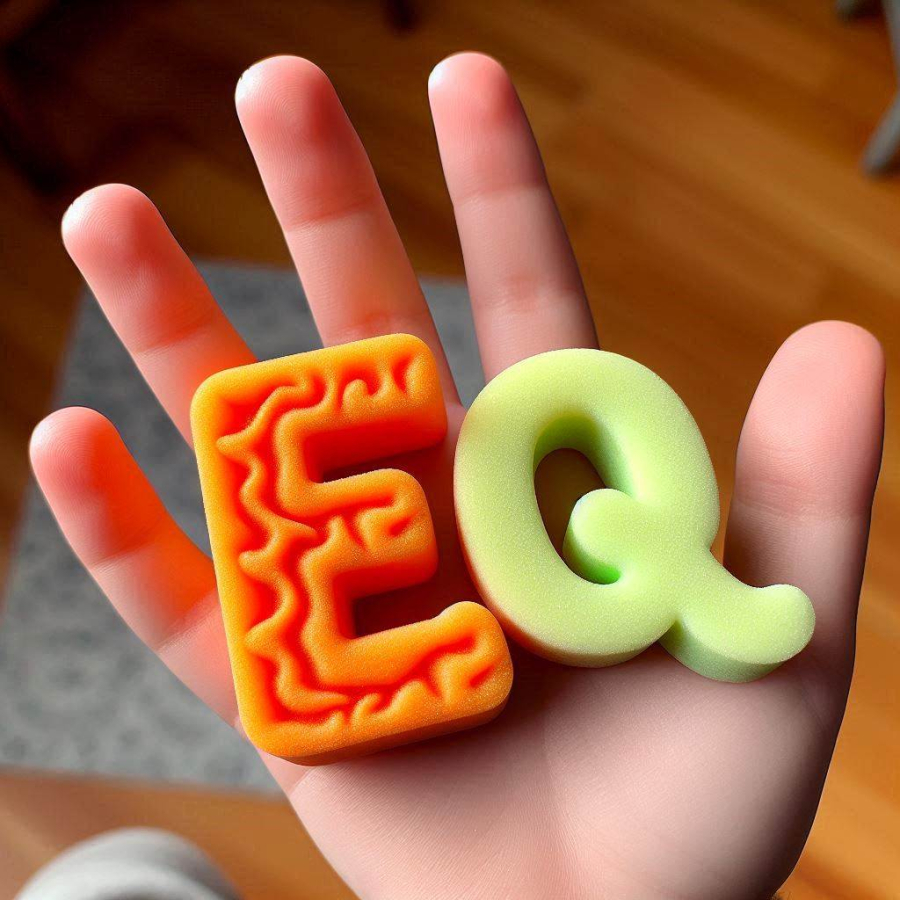Emotional Intelligence, or EQ, refers to an individual’s ability to recognize, control, and express their emotions, as well as understand and influence the emotions of others. EQ is considered a critical factor in achieving success and happiness in both personal life and career. Dr. Daniel Goleman, a renowned psychologist from Harvard University, once asserted that “20% of a person’s future depends on IQ, and 80% depends on EQ.”
While IQ can be enhanced through learning and education, EQ is primarily honed through life experiences. Parents play a significant role as companions on their children’s developmental journey.

IQ can be developed through education, but EQ is largely shaped by life experiences.
Professor Li Mai Jin, a renowned lecturer at the People’s Public Security University of China, frequently shares lectures, advice, and classic books on parenting. She serves as an inspiration and valuable guide for many parents in raising their children.
As an adolescent psychology expert, Professor Li has pointed out that children raised in the following three family styles often face challenges in developing their EQ.
Unhappy Parents
Professor Li Mai Jin emphasizes that the family environment significantly influences the personalities and emotional intelligence (EQ) of its members. In families where parents frequently clash, ranging from minor arguments to physical altercations, children are more likely to develop an irritable and quarrelsome disposition. Hurtful words exchanged during moments of anger can also inflict psychological wounds on children.
Parents serve as mirrors for their children. If they cannot manage their emotions, they will struggle to educate their offspring effectively. Therefore, it is crucial for parents to control their behavior and words when in the presence of their children.

Parents who cannot control their emotions will find it challenging to educate their children.
Strict Parents
Many parents believe that shaping a child’s character, whether good or bad, starts at a young age. As a result, they tightly control various aspects of their children’s lives, from diet and daily routines to more significant matters like choosing their friends.
Professor Li Mai Jin argues that most parents who exercise such tight control desire for their children to grow up according to their directives. However, they fail to realize that children with overly strict parents tend to exhibit rebellious behavior, pushing the boundaries set for them. Dr. Rochelle F. Hentges, a psychologist from the University of Pittsburgh, adds that overly strict parenting can backfire, increasing the likelihood of children engaging in delinquent behaviors, which threatens future educational endeavors.
Experts recommend that parents can mitigate the negative impact of strict upbringing by setting clear goals and strategies for their children, encouraging practice, and promoting participation in group activities.
Indulgent Parents
On the other hand, parents who are overly permissive or indulgent also face challenges in fostering and developing their children’s emotional intelligence (EQ). They often fail to express their emotions, always yielding to others’ opinions, and lack assertiveness in parenting.
Children raised in such environments often lack clear direction, becoming shy and lacking the skill to refuse. This can lead to them being taken advantage of and experiencing difficulties in life.

Indulgent parenting can hinder the development of children’s emotional intelligence (EQ)
Secrets to Enhancing Children’s Emotional Intelligence (EQ)
According to Professor Li Mai Jin, the first step for parents in improving their children’s EQ is to help them learn to face and manage their emotions. When children experience negative emotions, parents should accept and guide them through the process. For instance, when a child is crying, parents can offer comfort and empathy with words like, “We understand your sadness, and we’re here to help. How can we make you feel better?” When children are angry, parents should investigate the cause and communicate to make them feel understood. Using words like “Okay” and “Sorry” in conversations can help soothe and release their negative emotions.
Optimism is key to raising children with high EQ. It empowers them to face challenges head-on, remain resilient to their surroundings, and self-motivate.
Child-rearing experts offer advice on fostering optimism in children, including employing humor and imagination. For example, when asking children to tidy up their toys, parents can say, “Your car toys want to go back to their garage”; “The Lego blocks are tired and need to sleep, let’s put them to bed”; or “The pen and its cap are best friends, let’s reunite them.” Additionally, parents can recite a “magic phrase” with their children: “It’s okay,” to boost their confidence in facing difficulties.
The journey to developing and enhancing children’s emotional intelligence (EQ) is a long and continuous one. With patience, careful guidance, and education, parents can significantly enhance their children’s emotional intelligence.
1. Authoritarian Families: These families have a strict, controlling environment with high expectations and little flexibility. Children may struggle to express their emotions and have lower self-esteem.
2. Indifferent Families: In these families, parents are emotionally distant and may neglect their children’s emotional needs. This can lead to children with lower EQ who struggle to form secure attachments.
3. Permissive Families: Permissive parenting can result in children with lower EQ as they may lack structure, discipline, and clear boundaries. They may have difficulty regulating their emotions and behavior.
Learning Tips for Parents: 12 Japanese Techniques to Use with Your Children
Discover the 12 principles of teaching children in the traditional Japanese way that parents can learn with Dien May XANH! By instilling these principles when your children are young, you can ensure that they grow up to be obedient, smart and polite, the hallmarks of a successful education in Japan.
10 Habits That Parents Should Foster in Their Children from An Early Age
 Parents Should Foster in Their Children from An Early Age’>
Parents Should Foster in Their Children from An Early Age’>Are you a parent trying to figure out the best ways to raise a happy and well-rounded child? Learn 10 important habits and methods to instill in your kids from a young age!


































